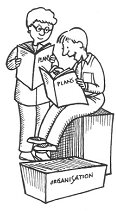SECTION 3
Planning for bargaining
STAGE ONE: LEARNING ABOUT YOUR EMPLOYER AND YOUR MEMBERS
1. Getting started: who will take on the job?
Bringing in a literacy program requires planning and organization. The
union must do its homework with the membership long before putting a
demand on the bargaining table.
First, decide who will have the responsibility for exploring work on basic
skills. Is it an already existing committee, such as the education
committee, or a new body? Is it the executive, or someone who is
designated to take on the job?
Those who take on the job should do their homework:
- Read the CLC Learning in Solidarity series of handbooks on literacy
and basic skills, in particular Learning for Our Lives: A Union Guide
to Worker-Centred Literacy, 2000.
- Attend a CLC or affiliate course on training or union-based literacy.
- Find out what your members need so that the union is better placed to
decide what kind of program it wants to bargain.
Where to get help
- Use the resources of your own union first. Some unions and locals
have an education and training committee which can take on the added
responsibility for this area of work. Many unions can also get help
from their national or district office, or from a central education
committee.
- Some provincial federations have literacy projects in place.
- The CLC Workplace Literacy Coordinator is available to help you.

